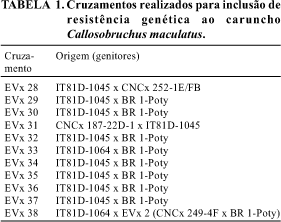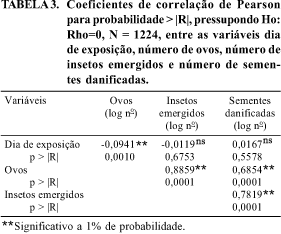The use of genetic resistance to the weevil (Callosobruchus maculatus (Fabr.)) has been investigated to identify sources of resistance. The main purpose of the present work was to incorporate the genetic resistance to this insect into cowpea plants (Vigna unguiculata (L.) Walp.) with other already desirable. Hybridization was carried out among the genotypes IT81D-1045 and IT81D-1064 (identified in International Institute of Tropical Agriculture (IITA), Nigeria, as resistant to the insect) and CNCx 252-1E/FB, CNCx 187-22D-1 and BR 1-Poty, all of them able to transfer resistance to viruses, drought tolerance, desirable commercial quality of grains, high production potential and adaptability to different environments. Segregating populations were obtained from these crossings and so driven by the SPD method (single pod descendent) with individual selections being made in the F5 generation. The obtained lineages were assessed together with materials of different origins, using associated parameters to the pest infestation. Results revealed that the genotypes showed differences concerned to the eggs number laid by, number of insects hatched and the number of damaged seeds; these variables were positive by and significantly correlated among them; the EVx 37-15E and EVx 37-2E lineages were the less damaged by the weevil; the lineages group that descends from the resistant parents presented values significantly inferior to those obtained by the others, indicating that the resistance to the insect is genetically transmitted.
Vigna unguiculata; improvement; genetic resistance; weevil





